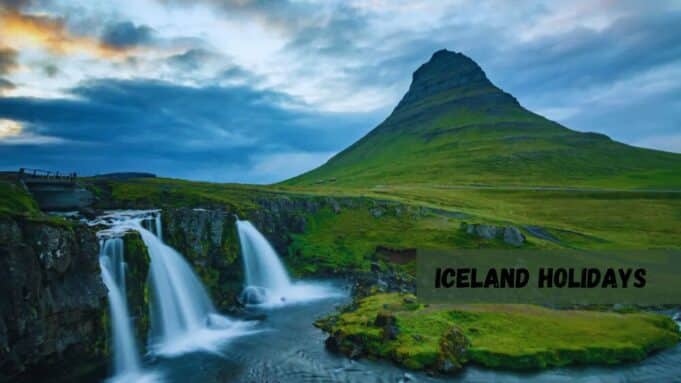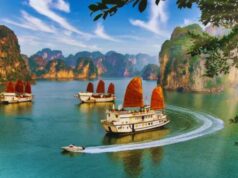Iceland is more than glaciers, volcanoes, and the Northern Lights; it’s a country where traditions run deep and celebrations are a blend of ancient Norse heritage, Christian customs, and modern creative spirit. The Iceland holidays reflect its history, its connection to nature, and the close-knit warmth of its communities.
From fireworks illuminating the midnight sky to midsummer festivals under the endless sun, holidays in Iceland are immersive, emotional, and often deeply tied to the dramatic landscape. Travelers who plan their trip around these special dates will find not only spectacular sights but also the opportunity to join in authentic local experiences that reveal Iceland’s true character.
Major National Iceland Holidays
Major national Iceland Holidays offer a unique blend of cultural pride, historic traditions, and lively celebrations. From winter feasts to summer parades, these events provide visitors with an authentic glimpse into Icelandic life and heritage.
New Year’s Day (January 1)
Icelanders say goodbye to the old year with some of the most vibrant New Year’s Eve celebrations in Europe, marked by massive community bonfires (brennur), informal neighborhood fireworks displays, and lively parties that last into the early hours.
On New Year’s Day, the pace slows, and families gather for meals featuring lamb, fish, and traditional desserts. For visitors, this is an ideal day to relax in a geothermal spa, watch the snow-covered landscapes from a café, or stroll through quieter city streets still twinkling with holiday lights.
Þorrablót (January–February)
Þorrablót is an ancient midwinter feast that honors endurance during Iceland’s long, dark winters. Rooted in Viking-age customs, it’s an unapologetically traditional dining experience where locals serve dishes like hákarl (fermented shark), súrsaðir hrútspungar (pickled ram’s testicles), and slátur (liver sausage), alongside more approachable fare like rye bread and smoked lamb.
Feasts are accompanied by folk songs, storytelling, and generous servings of brennivín, Iceland’s signature schnapps. Travelers attending a Þorrablót will gain a real sense of Iceland’s humor and resilience.
Easter (Páskar)
Easter in Iceland combines Christian traditions with a national love for sweets. The highlight for children is receiving oversized, beautifully decorated chocolate eggs filled with candy and a paper slip containing an Icelandic proverb.
Many towns host church services, spring concerts, and community gatherings. For travelers, Easter is a wonderful time to explore nature as days lengthen and the weather begins to shift toward spring, with fewer crowds compared to summer.
Related: Diamond Beach Iceland
Sumardagurinn Fyrsti (First Day of Summer)
Despite often falling on a chilly April day, Sumardagurinn Fyrsti celebrates the symbolic start of summer according to the old Norse calendar. Towns and cities hold parades, marching bands perform, and local shops offer discounts and treats.
For visitors, it’s an uplifting experience—proof of the Icelandic belief that summer is as much a state of mind as a temperature reading.
Iceland’s National Day (June 17)
National Day commemorates Iceland’s independence from Denmark in 1944 and the birthday of Jón Sigurðsson, a key figure in Iceland’s independence movement.
The entire country turns into a festival ground, with street performances, parades, speeches, and concerts. Reykjavík hosts the largest celebration, but even the smallest fishing villages mark the day with games, music, and flag-raising ceremonies.
Christmas (Jól)
Icelandic Christmas is a magical blend of old folklore and modern festivity. The season kicks off in early December with the arrival of the first Yule Lad—mischievous troll-like characters who visit children each night for 13 days before Christmas.
Homes and streets glow with lights, and holiday markets offer handmade crafts, hot drinks, and seasonal treats. The main Christmas meal, often featuring roast lamb, is enjoyed on December 24, followed by days of family visits and cultural events.
Seasonal Highlights and Travel Experiences
From winter’s Northern Lights to summer’s Midnight Sun, Iceland’s seasonal highlights and travel experiences offer unforgettable adventures year-round, blending dramatic landscapes, cultural festivals, and unique activities that showcase the island’s beauty in every season.
Winter
Winter in Iceland is perfect for those seeking dramatic natural beauty and cozy indoor traditions. From late September to early April, the Northern Lights dance across the night sky on clear evenings.
Winter sports like skiing, snowboarding, and snowmobiling are popular, as are ice caving tours inside glittering blue glaciers. Reykjavík and Akureyri light up with holiday decorations, creating a warm atmosphere despite the cold.
Spring
Spring in Iceland is a season of renewal. Migratory birds, including puffins, return to coastal cliffs, and wildflowers start to bloom across meadows. Days grow longer, allowing more time for sightseeing and road trips. Spring festivals celebrate music, literature, and local culture, and it’s one of the best times to explore without the peak-season crowds.
Summer
Summer is the busiest travel season, drawing visitors with its nearly 24-hour daylight. The Midnight Sun creates endless opportunities for hiking, camping, and exploring the highlands. Music festivals, from intimate folk gatherings to massive open-air concerts, fill the calendar. It’s also the season for horseback riding across mossy lava fields and kayaking through fjords.
Autumn
Autumn offers striking natural beauty as Iceland’s landscapes turn shades of gold, orange, and red. The return of darker nights means the Northern Lights often reappear in September. It’s also harvest season, with local markets selling fresh lamb, root vegetables, and berries. Cooler temperatures and fewer tourists make it a peaceful time to explore.
READ: Sky Lagoon Iceland
Unique Icelandic Festivals and Traditions

Iceland’s unique festivals and traditions blend Viking heritage, folklore, and modern creativity, offering visitors vibrant celebrations filled with music, food, and community spirit set against the country’s breathtaking natural landscapes.
Verslunarmannahelgi
This August bank holiday weekend is Iceland’s biggest travel holiday, with locals heading to campsites, music festivals, and community gatherings. Major events like the Þjóðhátíð festival in the Westman Islands feature live performances, fireworks, and singing that lasts late into the night.
Reykjavík Culture Night (Menningarnótt)
Held every August, this free citywide celebration turns Reykjavík into an open-air cultural stage. Streets fill with art installations, live music, food stalls, and performances, ending with a grand fireworks show over the harbor.
Food and Drink Festivals
From the Lamb Festival in the Westfjords to Beer Day on March 1, Iceland’s culinary calendar celebrates local flavors. Visitors can sample fresh seafood, lamb, dairy products, and craft beers, often while meeting the producers themselves.
Practical Tips for Spending Holidays in Iceland
- Plan early: Major festivals and holiday weekends often sell out accommodations and tours months in advance.
- Dress for the elements: Weather can change quickly; waterproof layers, sturdy footwear, and warm hats are essentials year-round.
- Join respectfully: Many holidays are deeply personal to locals—be friendly, follow local customs, and support small businesses during your visit.
Best Places to Visit During Holidays
- Reykjavík – Ideal for festivals, nightlife, and cultural events, with easy access to surrounding nature.
- Akureyri – Offers winter sports, charming Christmas markets, and a laid-back northern vibe.
- South Coast & Snæfellsnes Peninsula – Great for scenic drives, holiday photo opportunities, and smaller community celebrations away from the crowds.
Iceland Holidays 2026
Planning your Iceland holidays in 2026 means experiencing the country’s breathtaking landscapes while immersing yourself in unique cultural events. From January’s New Year’s celebrations with dazzling fireworks to the vibrant midsummer festivals under the Midnight Sun, each month offers something special.
Popular holidays such as Iceland’s National Day on June 17 and the Reykjavík Culture Night in August will bring you closer to local life, with parades, music, and food markets. Winter 2026 will be perfect for those chasing the Northern Lights, with long nights and fewer crowds. Booking early is essential—accommodations and tours for major holiday periods can sell out months in advance, especially in Reykjavík and along the South Coast.
Read More: How Do I Get to Fosslaug?
Iceland Holidays Northern Lights
One of the most magical aspects of an Iceland holiday is witnessing the Northern Lights. This natural phenomenon, also known as the aurora borealis, is visible from late September to early April, when dark skies and minimal light pollution create perfect conditions.
Pairing your holiday with seasonal celebrations, like the cozy Christmas period or February’s Þorrablót festival, adds cultural depth to your trip. Popular viewing spots include Thingvellir National Park, the Snæfellsnes Peninsula, and the Westfjords, but you can also book guided Northern Lights tours that take you far from city lights. For the best experience, stay multiple nights to increase your chances, and always check the aurora forecast.
Iceland Holiday Package
Booking an Iceland holiday package is a stress-free way to experience the country’s top attractions while taking part in its unique holiday festivities. Packages often combine flights, accommodations, and tours, ranging from winter escapes with ice cave visits and Northern Lights hunting to summer adventures with glacier hikes and music festival tickets.
Some packages are themed around specific celebrations, like New Year’s Eve in Reykjavík or Christmas in Akureyri, complete with special dinners and cultural experiences. Choosing a package allows travelers to save time on planning and ensures access to guided tours and priority bookings during busy holiday seasons.
Read Also: Iceland Tectonic Plates Diving Tours
Iceland Holidays and Traditions
Iceland holidays and traditions are a captivating mix of Norse heritage, Christian customs, and modern celebrations. Christmas is filled with folklore, from the mischievous Yule Lads to the watchful Christmas Cat, while National Day in June celebrates independence with parades and concerts.
Winter’s Þorrablót festival honors Iceland’s Viking past through traditional foods, music, and storytelling, and summer holidays like Sumardagurinn Fyrsti (First Day of Summer) welcome the new season with parades and community gatherings. For travelers, joining these traditions offers a deeper connection to Icelandic culture, transforming a scenic trip into an unforgettable cultural journey.
When is The Best Time to Visit Iceland For Holidays in 2026?
The best time depends on what you want to experience. For long days and cultural festivals, visit between June and August, when the Midnight Sun creates nearly 24 hours of daylight.
If your focus is on winter holidays and the Northern Lights, plan for October to March, when the nights are longest. Major holiday events like New Year’s Eve, Christmas markets, and the Reykjavík Culture Night add a cultural layer to your trip.
Can I See the Northern Lights During My Iceland Holiday?
Yes, but only between late September and early April, when the skies are dark enough. The best viewing conditions are away from city lights in areas like Thingvellir National Park, the Snæfellsnes Peninsula, and the Westfjords.
Staying several nights in winter increases your chances, and booking a guided Northern Lights tour ensures you reach the best spots with expert insight.
Are Iceland Holiday Packages Worth It?
Absolutely—holiday packages can save you time, secure prime accommodations, and bundle in popular tours that often sell out during peak seasons. Packages may include experiences like Northern Lights hunting, glacier hiking, or special holiday events such as Christmas dinners and New Year’s celebrations.
They are especially valuable if you’re visiting during busy travel periods, when planning everything individually can be challenging.
Also Read: Mulagljufur Canyon Hike
What Traditions Should I Know About When Visiting Iceland For The Holidays?
Icelandic holidays are rich in traditions. At Christmas, watch for the 13 Yule Lads who visit children each night, and learn about the Christmas Cat, a mythical creature said to eat those without new clothes for the holiday.
In summer, the First Day of Summer (Sumardagurinn Fyrsti) marks the seasonal change with parades and celebrations. Participating in these traditions not only makes your trip more memorable but also connects you with local culture.
Do I Need To Book Holiday Activities In Advance?
Yes—especially if you’re visiting during major holidays like New Year’s Eve, Christmas, or National Day in June. Accommodations, guided tours, and special event tickets can sell out months ahead. Booking early also ensures you can secure a spot for popular seasonal experiences like ice cave tours, whale watching, or attending cultural festivals.
Conclusion
From roaring bonfires on New Year’s Eve to midnight concerts under the summer sun, Iceland’s holidays are a window into the country’s spirit and resilience. Each celebration—whether rooted in Viking tradition, Christian faith, or modern creativity—offers travelers the chance to connect deeply with the land and its people. Visiting during these special times turns a trip into a story worth telling, filled with warmth, community, and unforgettable memories.
To Know More: Iceland Northern Lights
Frequently Asked Questions (FAQs) about Iceland Holidays
Planning a trip to Iceland during its vibrant holiday seasons? This FAQ section answers common questions about celebrations, traditions, and travel tips to help you make the most of your Iceland holiday experience.
When Is The Best Time To Travel For Iceland Holidays?
The best time depends on what you want to experience. Summer (June–August) offers long daylight hours, warm weather, and cultural festivals like Iceland’s National Day. Winter (October–March) is perfect for Northern Lights viewing, festive Christmas markets, and unique celebrations like Þorrablót.
Which Holidays Are The Biggest In Iceland?
Some of the most important Icelandic holidays include Iceland’s National Day (June 17), Christmas (Jól) with its 13 Yule Lads, New Year’s Eve with massive fireworks and bonfires, Sumardagurinn Fyrsti (First Day of Summer), and Þorrablót, a midwinter feast celebrating traditional foods and Viking heritage.
Can I See The Northern Lights During My Iceland Holiday?
Yes, but only between late September and early April when nights are long and skies are dark. The best chances are in rural areas away from light pollution, such as Thingvellir National Park, the Snæfellsnes Peninsula, or the Westfjords.
Are There Special Festivals During Iceland Holidays?
Yes. In addition to national holidays, Iceland hosts unique festivals like Reykjavík Culture Night in August, Verslunarmannahelgi (Merchants’ Weekend) in early August, the Lamb Festival in the Westfjords, and Beer Day on March 1, celebrating the end of beer prohibition.
What Should I Pack For An Iceland Holiday?
Regardless of the season, pack layers to adapt to changing weather conditions. Include a waterproof jacket, sturdy walking shoes, warm sweaters, gloves, and a hat. In summer, bring sunglasses and an eye mask for the Midnight Sun; in winter, pack thermal base layers for cold nights.
Are Iceland Holiday Packages A Good Option?
Yes. Holiday packages often bundle flights, hotels, and tours, making it easier to secure spots for popular activities during busy seasons. Packages can be themed around seasonal highlights, like Christmas, New Year’s, or Northern Lights hunting trips.
Can I Experience Local Traditions As A Tourist?
Absolutely. Tourists are welcome at public celebrations, including street parades, concerts, seasonal markets, and cultural festivals. Many small towns offer a warm welcome, and joining in respectfully allows you to experience Icelandic traditions firsthand.
















[…] Related: Major National Iceland Holidays […]
Comments are closed.